Primitive Methodism and the Wiltshire Foresters
Woodfalls (Salisbury Third) Circuit
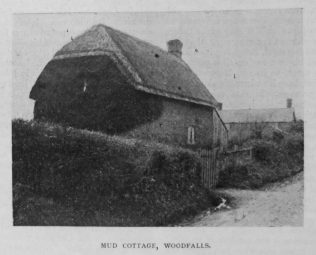
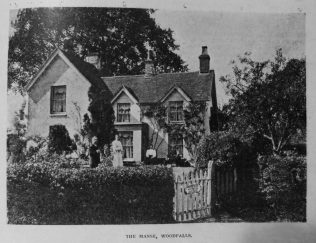
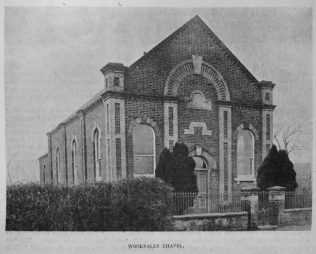

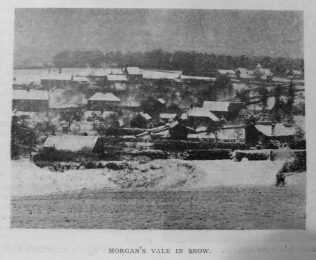

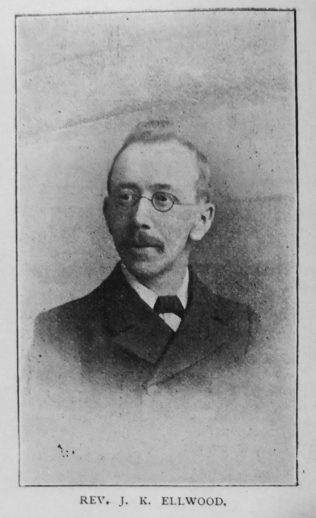
Transcription of Sketch in the Primitive Methodist Magazine by W Watson
The term “Wiltshire Foresters ” may possibly be taken exception to as an anachronism, seeing that the whole of the New Forest is now included within the borders of Hampshire. It is well known, however, that this royal preserve was at one time far more extensive than at present, and it appears that, in the early years of the last century, portions lying on the southern border of Wiltshire, in the neighbourhood of Downton and elsewhere, were surrendered by the crown in exchange for forest rights, etc. In some of these parts, such as Woodfalls, to which this article will principally refer, the old name is still retained, and the people are popularly known as “Foresters.”
Downton, an ancient village rich in historical associations, is reached by rail from Salisbury. A long, narrow, winding lane, which, during the summer months, forms a lovely walk, leads to the high plateau rising on the east of the village. Near the top of the steep ascent we pass a few cottages and a quiet farmhouse, and on the brow of the hill, notice a charming little dwelling named Woodfields Cottage. It is the Primitive Methodist manse. Woodfalls itself is a small scattered village of quite ordinary appearance. Some of the houses are new and modern in structure, while others, with their mud walls, thatched roofs and tiny windows, look very ancient indeed. The inhabitants of these mud cottages claim for them the virtue of being warm in winter and cool in summer, but one finds it difficult to fancy such dimly-lighted rooms, or altogether divest one’s mind of the suspicion that during heavy rains the roofs might not be perfectly water-proof. We have seen that the manse of the Primitive Methodist minister graces one end of the village; at the other stands the chapel, a substantially built, extremely neat, and commodious structure, of which the society and villagers may well feel proud. It is the only place of Worship in Woodfalls, almost the only public building, and from an artistic point of view is undoubtedly the ornament of the place. One would scarcely have supposed that the little, and somewhat common-place village in which it stands, furnished the society, which forms the head of a vigorous and growing circuit. Yet such is the case, and our purpose is to relate the story of its development, believing that what has proved interesting to us may be equally interesting to others.
There lies before us as we write, a letter dated July 28th, 1890, and signed by William Flemington, of Martin. This old veteran, since deceased, was one of the first converts of the Salisbury Mission which was begun about 1830. The letter is one which only an aged man whose whole life had been spent in the service of his church could have penned. The handwriting is cramped and irregular, the thoughts abrupt and disconnected, but every sentence pulsates with living memories and sublime hopes. Old fellow-labourers, such as Jacob Everlv, and James Parham, who had finished their course and entered into rest, are referred to in terms full of affection, and past experiences in work for the Lord are mentioned with a pathos which is very affecting. “Fifty-eight years ago,” he writes, referring to Woodfalls, “I climbed your hill the first time.” . . . “ You have done pretty well on the hill during these fifty-eight years. My dear sir! Look up. We shall do better still.” It is generally believed that this visit marked the introduction of Primitive Methodism into Woodfalls.
That the village was direly needing the advent of some such evangelistic movement, to rescue the people from the gross wickedness and lamentable ignorance which then characterised them, is very evident. Drunkenness and fighting were so common as to be scarcely noticed. Sheep-stealing, deer-stealing, and smuggling were common vices. It is related that one of the villagers, a publican, was a receiver of stolen goods. On one occasion two men stole some of his own sheep and then sold them to him. Of course, he soon discovered that he had been imposed upon, but the thieves knew that they were safe. If they had stolen the sheep he had received them, and in the eyes of the law was equally guilty. For this village Primitive Methodism did a good work, a work such as it has accomplished for hundreds of other villages in our land, and its happy effects are to be seen to-day in the improved morals and ennobled lives of its people.
The first meetings were held under some trees at the western end of the village. Then the use of a small cottage, close at hand, was obtained, in which the services were held until a second cottage, in a more central position, was placed at the disposal of the infant society. One Sunday evening when James Parham, a noble worker received by Salisbury from the Motcombe Circuit, was preaching, the rain beat in through the defective windows and door and thatch to such an extent that a consultation was held, and it was then and there decided to build a chapel. The new premises were opened 1833 by Rev. D. Day. The walls were of mud, and it boasted a thatched roof and earthen floor, but it was their own property, and a very great advance in convenience and comfort, an excellent return, in fact, for an outlay of £50. Here the society and congregation so increased that ten years later it was found necessary to enlarge the chapel and add a gallery. Many interesting stories of this period are related by the older members. One such story, illustrating their primitive, summary and forester-like style of dealing with offenders, and also exhibiting the Woodfalls Christian in an early stage of development, we will venture to relate. The congregations were being seriously disturbed by the bad behaviour of some irreverent hearers. One afternoon two young men made themselves particularly troublesome. So a member of the society stalked up the chapel, stretched out his long arm, and dealt the nearer offender a hearty buffet on the ear, knocking his head against that of the other young man, whose head in turn came in violent contact with the wall. The affair was amicably settled outside.
In 1875, the chapel having become old and antiquated, it was decided to build a new one. An account reached the writer to the effect that this was the occasion of that remarkable trustees’ meeting in which the two incompatible resolutions, 1st. To worship» in the old chapel until the new one was completed; 2nd. To use the material of the old chapel for the construction of the new one were passed. This, however, the trustees deny, strongly resenting such a re?ection upon their shrewdness and unquestionable business capacity. Certainly they were not lacking in shrewdness. When Lord Radnor, the grandfather of the present Earl, was appealed to for help, he wanted to know what good they had done in the place. He was reminded of the great number of poachers belonging to the village with whom, in his capacity as magistrate, he had in past years been brought into contact, and of the further fact that Primitive Methodism had changed all this. The argument was effective, and secured for them a handsome donation. The people had a mind to work, the chapel was built, and the results have proved the wisdom of the step. The moral character of the village has been completely transformed. The eighty members in society are, with scarcely an exception, total abstainers and non-smokers, and their enthusiasm in temperance work is shown by the fact that they form the principal part of the workers in the Temperance Hall.
Some of the neighbouring villages now included in the Woodfalls Circuit were not so successful in their attempts to secure permanent places of worship. Indeed, two or three of them supply striking examples of the difficulties experienced by our pioneers in this respect. At Breamore, which was visited by missionaries from the Motcombe Circuit in the summer of 1830, nearly half a century passed before land could be obtained on which to build. The society first met in a cottage, but on the land reverting to the baronet, they were turned out. Some years after another man opened his cottage for worship, but he was told that he must either close his doors or leave the place. These were times in which the village had its confessors, men whose names are still cherished because they were prepared to suffer loss for the sake of Christ and a good conscience. Occasional services were held out of doors, or wherever shelter could be obtained, until 1870, when a young man named George Edsall was converted. He admitted them to his house, which was freehold property, and was wishful to sell one of his cottages to the society, but there were grave difficulties in the way of the transfer, and it was not until a year before he died that the property was acquired. The new chapel was built in 1876. Had that attempt failed there would probably have been no Primitive Methodist Chapel in Breamore to-day, as it still remains the only available freehold site. At Whaddon, which was missioned nearly seventy years ago by Mr. James Parham and others, no ground could be got till about seventeen years ago. An account of the struggles of this society lies before me as I write, supplied by Mr. George Dowty, the honoured patriarch of the Woodfalls Station. It reads almost like romance. They preached, it has been said, in almost every house in Whaddon. But their perseverance was ultimately rewarded. A piece of ground in the market was purchased by Mr. C. Powell, of Salisbury, who gave part of it as a site for the chapel, also a donation of £5. The building was at once proceeded with, and by the time of its ?rst anniversary in 1885 the whole cost had been raised. In 1889 Mr. William London, a poor man, who had clung to the cause through all its hardships, and who, by great personal sacrifice had saved about £90, left the whole amount to the society, now numbering more than fifty members, and his memory is perpetuated in the useful schoolroom, which stands at the rear of the chapel.
Six years ago, a somewhat remarkable circumstance added to the Old Salisbury Circuit a chapel in Morgan’s Vale, near Woodfalls. It had been built by Mr. H. Read, of Downton, a somewhat eccentric gentleman, who, up to the time of his death, carried it on at his own expense. In his will it was offered to the Primitives on condition that they paid down £150. The offer was at once accepted, and the chapel, valued at £500, came into our possession. A good work is being done there, and the last £50 was paid off in January of the present year. The chapel has a very neat appearance, and has recently been renovated and supplied with a new organ.
When the Salisbury Circuit. was divided three years ago, Woodfalls became the head of the Third Circuit, and the Rev. J.K. Ellwood was appointed its first minister. The qualities, which, as a probationer, so endeared him to the people of Southend and Walthamstow, have won for him equal respect and affection during his first superintendency, while the successes which have been achieved must be most satisfactory to minister and people alike. The increased expenditure necessitated by the new arrangement has been met, a comfortable manse has been provided, chapel debts are being considerably reduced, the congregations and membership have increased, the week evening attendance at the various societies being especially good, and the missionary income has been raised more than £20. For some time conversions at the Sunday evening and other services have been a frequent occurrence, and the spiritual condition of the societies seems to be highly satisfactory. We are glad to have had the opportunity of becoming acquainted with our Forester brethren, and of giving to their good work a wider publicity. Let us hope that the successes of the past three years are but a happy augury of greater prosperity in the years to come.
References
Primitive Methodist Magazine 1901/350





No Comments
Add a comment about this page